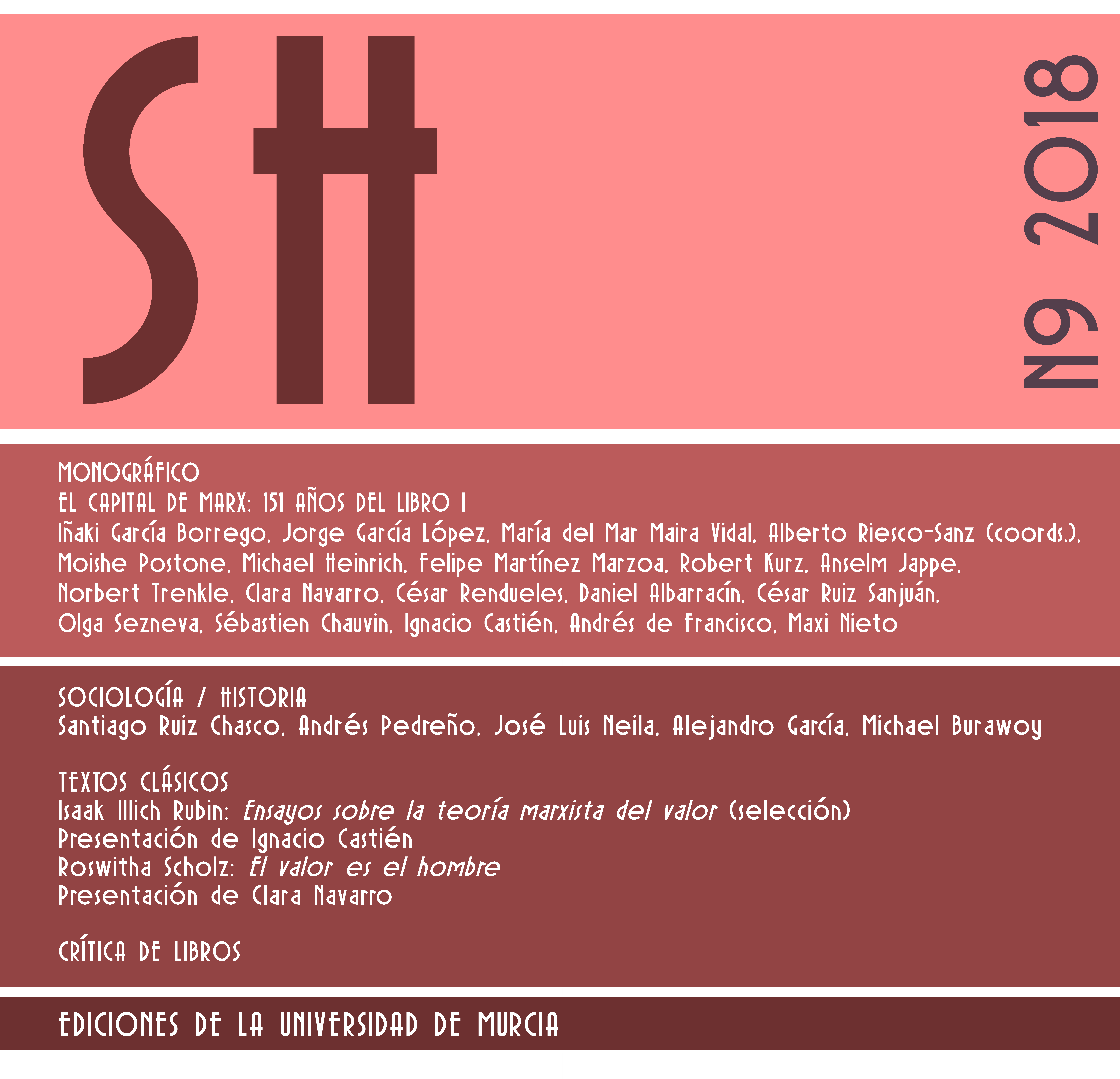La mercancía general y su misterio
Sobre el significado del dinero en la crítica de la economía política
Supporting Agencies
- No hay
Abstract
The General Commodity and its Mystery. On the meaning of Money in the Critique of Political Economy.
In the Marxian critique of political economy, money is understood as the universal commodity set apart from the world of particular commodities. The fact that gold occupied that position in Marx’s time has been used to justify discounting his monetary theory as a variant of the nineteenth century metallist concept of money. It has been left out of the contemporary monetary debate—wrongly.
The Marxian approach not only has the capacity to explain the irrationality of the monetary system on the basis of the irrationality of the capitalist mode of production. It also permits a categorical analysis of the contemporary monetary system and the history of its emergence. Contrary to the generally accepted view, the elimination of gold backing did not make the monetary commodity disappear. It only changed it. Today, the tradable debt claims and sureties that central banks accumulate in the course of “money creation” occupy the position of monetary commodity. This change in the monetary commodity was inevitable as a means to liberate capital accumulation from dependency on prior surplus-value generation in reaction to the crisis of valorization that started in the seventies. But it also created new potentialities for crisis. Unlike gold, the new monetary medium is itself threatened by the crisis of devaluation.
Downloads
-
Abstract997
-
pdf (Español (España))1725
References
Von Braun, Ch., (2012): Der Preis des Geldes, Berlin, Aufbau Verlag.
Dtv Lexikon München, F.A. Brockhaus GmbH, 1992 (diccionario de alemán).
Graeber, D, (2012): Schulden: die ersten 5000 Jahre, Stuttgart, Klett-Cotta Verlag. (Deuda: una historia alternativa de la economía. Barcelona, Planeta.)
Hicks, John, (1967): Critical Essays in Monetary Theory, Oxford (Reino Unido), Clarendon Press.
Lohoff, E. (1998): “Geldkritik und Antisemitismus”, Wien, in Weg und Ziel, 2. http://www.krisis.org/1998/geldkritik-und-antisemitismus/ (consultado el 3/11/2017).
Lohoff, E. y Trenkle, N. (2012), Die große Entwertung, Warum Spekulation und Staatsverschuldung nicht die Ursache der Krise sind. Münster: Un-Rast Verlag.
Lohoff, E. (2014): “Kapitalakkumulation ohne Wertakkumulation” in http://www.krisis.org/2014/kapitalakkumulation-ohne-wertakkumulation/
(consultado el 12/10/2017).
Lohoff, E. (2016): “Die letzten Tage des Weltkapitals” in htttp://www.krisis.org/2016/die-letzten-tage-des-weltkapitals/ (consultado el 10/10/2017).
MEW 13 = Marx, K. (1961): Zur Kritik der Politischen Ökonomie in Marx-Engels-Werke Bd. 13, Berlin 1961. (Contribución a la crítica de la economía política. México, Siglo XXI, 2008a)
MEW 23 = Marx, K. (1983): Das Kapital, Band 1 Marx-Engels-Werke Bd. 25 Berlin 1983. (El capital. Libro I. México, Siglo XXI, 2008.)
MEW 25 = Marx, K. (1965): Das Kapital, Band 3 Marx-Engels-Werke Bd. 25 Berlin 1965. (El capital. Libro III. México, Siglo XXI, 2009.)
MEW 42 = Marx, K. (1983): Ökonomische Manuskripte 1857/58. (Elementos fundamentales para la crítica de la economía política. Borrador. 1857-1858 (Grundrisse). Vol. 1. México: Siglo XXI, 2007.)
Pahl, H. (2008): Das Geld in der modernen Wirtschaft. Frankfurt, Campus Verlag.
Polanyi, K., (1990): The Great Transformation. Boston (EEUU): Beacon Press.
Postone, M. (2003): Zeit, Arbeit und gesellschaftliche Herrschaft, Freiburg 2003. (Ed. esp: Tiempo trabajo y dominación social: una reinterpretación de la teoría crítica de Marx. Madrid: Marcial Pons, 2006.)
Postone, M. (1991): “Nationalsozialismus und Antisemitismus”, Kritik und Krise 4/5.
Schumpeter, J. A. (1946): Kapitalismus, Sozialismus und Demokratie, Bern: UTB. (Capitalismo, socialismo y democracia. Barceloma, Página indómita, 2015. )
Smith, A. (1869) Lectures on Justice, Police, Revenue and Arms, delivered in the University of Glasgow, by Adam Smith. Reported by a Student in 1763 and edited with an Introduction and notes, by Edwin Cannan. Oxford (Reino Unido): Clarendon Press. http://oll.libertyfund.org/titles/smith-lectures-on-justice-police-revenue-and-arms-1763 (consultado el 28/12/2017).
Smith, A. (2005): Wohlstand der Nationen, München, Dtv verlag. (Ed. en esp.: Investigación sobre la naturaleza y causas de la riqueza de las naciones. México DF: F. C. E., 1986)
Stavenhagen, G. (1969): Geschichte der Wirtschaftstheorie, Göttingen, Vandenhoeck & Ruprecht.
Türcke, Ch, (2015): Mehr! Philosophie des Geldes, München, C. H. Beck.
Wirtschaftlexicon (2015): “Geldbasis” en http://www.wirtschaftslexikon.co/d/geldbasis/geldbasis.htm (consultado el 12/9/2017).
Las obras que se publican en esta revista están sujetas a los siguientes términos:
1. El Servicio de Publicaciones de la Universidad de Murcia (la editorial) conserva los derechos patrimoniales (copyright) de las obras publicadas, y favorece y permite la reutilización de las mismas bajo la licencia de uso indicada en el punto 2.
2. Las obras se publican en la edición electrónica de la revista bajo una licencia Creative Commons Reconocimiento-NoComercial-SinObraDerivada 4.0 España (texto legal). Se pueden copiar, usar, difundir, transmitir y exponer públicamente, siempre que: i) se cite la autoría y la fuente original de su publicación (revista, editorial y URL de la obra); ii) no se usen para fines comerciales; iii) se mencione la existencia y especificaciones de esta licencia de uso.
3. Condiciones de auto-archivo. Se permite y se anima a los autores a difundir electrónicamente las versiones pre-print (versión antes de ser evaluada) y/o post-print (versión evaluada y aceptada para su publicación) de sus obras antes de su publicación, ya que favorece su circulación y difusión más temprana y con ello un posible aumento en su citación y alcance entre la comunidad académica. Color RoMEO: verde.










